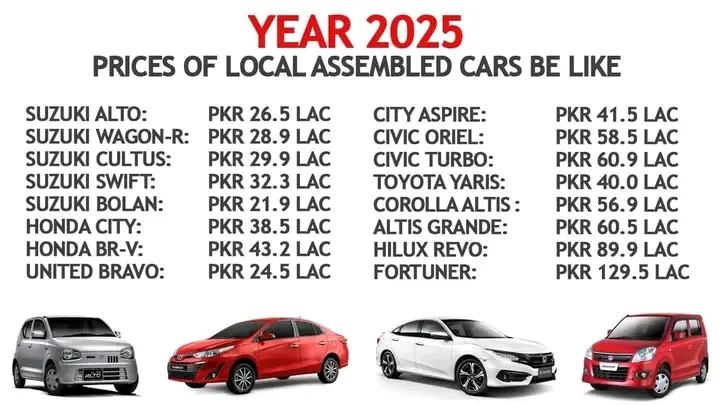Suzuki Car Prices Surge by Up to Rs. 186,446
Introduction
Suzuki Car New Prices Surge by Up to Rs. 186,446,Suzuki Car New Price,Latest Car price in Pakistan,New car Price, Recent Car Price, On July 1, 2025, Pak Suzuki Motor Company (PSMC) announced a substantial increase in car prices across its entire model range, with certain variants seeing a hike of up to Rs. 186,446. This change comes on the heels of the Federal Budget 2025–26, where the Government of Pakistan introduced two significant fiscal adjustments impacting the automobile sector: a hike in Sales Tax from 12.5 percent to 18 percent, and the introduction of a new NEV (New Enhanced Value) Levy.
As one of Pakistan’s most trusted and widely used auto manufacturers, Suzuki’s pricing strategy is crucial not only for consumers but also for the automobile industry and broader economy. These price increases will have ripple effects across various income segments, especially among middle-class families, small businesses, and first-time car buyers.
This article delves into the causes, implications, and potential future impact of Suzuki’s new pricing structure.
Government Fiscal Policy and Its Role in Price Hike
The New Sales Tax Regime
The revised federal budget increased the sales tax on vehicles from 12.5 percent to 18 percent, a significant 5.5 percent jump. While this may seem modest in percentage terms, it has a pronounced effect on vehicle prices due to the high base cost of cars.
The sales tax hike directly affects the retail price of every vehicle sold. The manufacturers, having limited capacity to absorb such tax-induced cost escalation, have transferred this burden to end-users.
Introduction of the NEV Levy
The NEV (New Enhanced Value) Levy is a newly introduced charge that specifically targets the value addition in the automobile supply chain. This levy, when coupled with the increased sales tax, contributes to an overall cost inflation in car manufacturing and distribution.
The combined effect of these policies means that car manufacturers are forced to reassess their pricing models. Suzuki, being a mass-market brand, has implemented an across-the-board increase, signaling that this is not a selective response but a systemic adjustment due to fiscal pressure.
New Suzuki Car Prices in Detail
Here’s a breakdown of the old versus new prices of Suzuki cars following the July 2025 revision:
Alto Series
- Alto VXR
- Old Price: Rs. 2,827,000
- New Price: Rs. 2,994,861
- Increase: Rs. 167,861
- Alto VXR AGS
- Old Price: Rs. 2,989,000
- New Price: Rs. 3,166,480
- Increase: Rs. 177,480
- Alto VXL AGS
- Old Price: Rs. 3,140,000
- New Price: Rs. 3,326,446
- Increase: Rs. 186,446
Cultus Series
- Cultus VXR
- Old Price: Rs. 4,049,000
- New Price: Rs. 4,089,490
- Increase: Rs. 40,490
- Cultus VXL
- Old Price: Rs. 4,316,000
- New Price: Rs. 4,359,160
- Increase: Rs. 43,160
- Cultus AGS
- Old Price: Rs. 4,546,000
- New Price: Rs. 4,591,460
- Increase: Rs. 45,460
Swift Series
- Swift GL MT
- Old Price: Rs. 4,416,000
- New Price: Rs. 4,460,160
- Increase: Rs. 44,160
- Swift GL CVT
- Old Price: Rs. 4,560,000
- New Price: Rs. 4,605,600
- Increase: Rs. 45,600
- Swift GLX CVT
- Old Price: Rs. 4,719,000
- New Price: Rs. 4,766,190
- Increase: Rs. 47,190
Every and Ravi Series
- Every VX
- Old Price: Rs. 2,749,000
- New Price: Rs. 2,912,230
- Increase: Rs. 163,230
- Ravi VXR
- Old Price: Rs. 2,799,000
- New Price: Rs. 2,965,200
- Increase: Rs. 166,200
- Ravi Pickup
- Old Price: Rs. 1,956,000
- New Price: Rs. 1,975,560
- Increase: Rs. 19,560
- Ravi Without Deck
- Old Price: Rs. 1,881,000
- New Price: Rs. 1,899,810
- Increase: Rs. 18,810
Consumer Impact Analysis
Effects on Entry-Level Buyers
Models like the Alto VXR and Every VX are among the most affordable options in the Pakistani auto market. A price increase of Rs. 160,000 to Rs. 180,000 on these models makes a significant difference for:
- First-time buyers
- Lower-middle-class families
- Students and self-employed individuals
This price hike may push prospective buyers to reconsider or delay their car purchase, or even shift toward the used car market, which could see a spike in demand and pricing.
Small Businesses and Commercial Users
The Ravi Pickup and Every series are often used by small businesses for logistics, transport, and goods delivery. With price jumps of up to Rs. 166,000, entrepreneurs in need of small commercial vehicles may be unable to afford new models. This could stifle microeconomic activity and limit mobility for emerging vendors and startups.
Industry-Wide Repercussions
Impact on Automobile Sales
Historically, car sales in Pakistan have been highly sensitive to price fluctuations. A surge in prices, especially without corresponding financing relief or government subsidies, leads to a slowdown in sales volumes. Dealerships may struggle with unsold inventory, and automakers might be forced to reduce production.
Shift Toward Used Cars and Imported Hybrids
This scenario may benefit:
- Used car dealerships
- Grey market imports
- Owners of fuel-efficient, hybrid, or older models
The rise in new car prices can indirectly boost sales of used vehicles as buyers look for affordable alternatives.
Possible Job Losses
A prolonged slump in new car sales can lead to:
- Job cuts at manufacturing plants
- Layoffs in dealership networks
- Reduced contract work for logistics and parts suppliers
Expert Insights and Economic Analysis
Inflationary Pressure
Pakistan’s overall inflation and rupee depreciation have already eroded consumers’ purchasing power. This new price hike exacerbates affordability issues. Middle-income households, already burdened by increased utility and grocery bills, are now priced out of the new car market.
Unmet Demand
The demand for low-cost, fuel-efficient vehicles remains high. However, with entry-level vehicles now approaching Rs. 3 million, there is a glaring absence of options for budget-conscious consumers.
What Needs to Be Done
Policy Recommendations
- Reevaluate NEV Levy: The government could reconsider or revise the structure of the NEV Levy to ease industry burdens.
- Offer Tax Relief on Entry-Level Cars: Lowering taxes on smaller, environmentally friendly cars could promote accessibility.
- Encourage Local Manufacturing: Incentivizing local production and reducing reliance on imports for parts may help control costs.
- Introduce Car Financing Subsidies: Government-supported financing options could make vehicles more affordable to a wider segment.
Auto Industry Actions
- Local Component Development: Increasing the use of locally manufactured parts can reduce production costs.
- New Affordable Models: Suzuki and other manufacturers should consider introducing ultra-low-cost models tailored for the Pakistani market.
- Leasing and Installment Options: Flexible, low-interest leasing can bridge the affordability gap for many consumers.
Public Sentiment and Market Outlook
Social media reactions reflect frustration and disappointment among potential car buyers. Hashtags related to #SuzukiPriceHike and #Budget2025 have trended in recent days. Many users have compared the current situation to post-2022 economic instability, when car sales also dropped dramatically.
Looking ahead, unless government and industry stakeholders intervene, Pakistan may see a prolonged slowdown in the automobile sector, which is closely tied to the nation’s economic health.
Conclusion
The Suzuki price hike, driven by fiscal changes in the Federal Budget 2025–26, represents a broader challenge facing Pakistan’s auto sector. While tax reforms are necessary for government revenue, their unintended consequences can significantly impact consumer affordability, automobile sales, and economic mobility.
As prices increase, the gap between supply and consumer demand will widen unless policy and industry measures are implemented swiftly. For now, the onus lies on both the government and automobile companies to balance fiscal responsibility with the need to ensure affordable transportation for the people of Pakistan .






